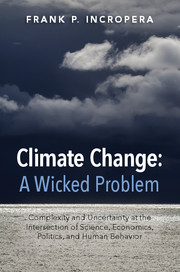 Climate Change: A Wicked Problem
Climate Change: A Wicked Problem Book contents
- Frontmatter
- Dedication
- Contents
- Foreword by Anthony F. Earley Jr.
- Foreword by G.P. “Bud” Peterson
- Foreword by Arun Majumdar
- Preface
- Acknowledgments
- Abbreviations
- 1 Energy, economics, and climate change
- 2 The Earth's climate system
- 3 Greenhouse gases
- 4 Global warming
- 5 Consequences of global warming
- 6 Mitigation, adaptation, and geoengineering
- 7 Public policy options
- 8 The politics of global warming: a history lesson and future prospects
- 9 Dissenting opinions: the great hoax
- 10 The ethics of climate change
- 11 A way forward
- Appendix A Units and conversion factors
- Appendix B Fossil fuels
- Appendix C Anthropogenic sources of natural gas and methane
- Appendix D Environmental time scales and inertia
- Appendix E Coal-fired power plants: operating conditions and costs of carbon capture and sequestration
- Notes
- References
- Index
- Plate section
9 - Dissenting opinions: the great hoax
Published online by Cambridge University Press: 05 October 2015
- Frontmatter
- Dedication
- Contents
- Foreword by Anthony F. Earley Jr.
- Foreword by G.P. “Bud” Peterson
- Foreword by Arun Majumdar
- Preface
- Acknowledgments
- Abbreviations
- 1 Energy, economics, and climate change
- 2 The Earth's climate system
- 3 Greenhouse gases
- 4 Global warming
- 5 Consequences of global warming
- 6 Mitigation, adaptation, and geoengineering
- 7 Public policy options
- 8 The politics of global warming: a history lesson and future prospects
- 9 Dissenting opinions: the great hoax
- 10 The ethics of climate change
- 11 A way forward
- Appendix A Units and conversion factors
- Appendix B Fossil fuels
- Appendix C Anthropogenic sources of natural gas and methane
- Appendix D Environmental time scales and inertia
- Appendix E Coal-fired power plants: operating conditions and costs of carbon capture and sequestration
- Notes
- References
- Index
- Plate section
Summary
Whether as questions or comments following a presentation on climate change or in the course of casual conversation, I am often confronted by strongly held views on the subject. The tone is typically collegial and open to dialog, but it can get tense, if not hostile. In the United States, the issue is ideologically polarized, and it doesn't take much for discussions to become emotional. I've had enough of these interactions to prompt me to wonder, given the knowledge base on warming and climate change: What differentiates those who summarily dismiss the issue from those who believe it merits serious attention?
The political-corporate axis
Early in the history of concerns for global warming, influential elements of the U.S. business community viewed the issue as a threat and were determined to suppress it by whatever means, including the use of political leverage. Establishment of the IPCC in 1988 was followed almost immediately by formation of the Global Climate Coalition (GCC), an industrial consortium of major GHG emitters seeking to question the science of climate change by supporting organizations such as the Competitive Enterprise Institute (CEI) and the American Petroleum Institute (API) to act as attack dogs. Numerous lobbying and public relations efforts were launched to cast doubt on evidence supporting global warming, even when engineers and scientists within the participating companies were affirming the contribution of GHG emissions to warming. Although the GCC disbanded in 2002, vestiges continued to challenge the authenticity of climate change. Casting doubt was the operative strategy, however specious the arguments, and became a tour de force for challenging the science of climate change in the U.S. Congress.
As described in Section 8.6, the strategy has been successfully used to kill legislative measures to curb GHG emissions. In the Senate, opposition has been led by James Inhofe of Oklahoma, an influential member of the Environment and Public Works Committee who views global warming as a hoax, perpetuated by alarmists (Carey, 2006a).
- Type
- Chapter
- Information
- Climate Change: A Wicked ProblemComplexity and Uncertainty at the Intersection of Science, Economics, Politics, and Human Behavior, pp. 199 - 213Publisher: Cambridge University PressPrint publication year: 2015


